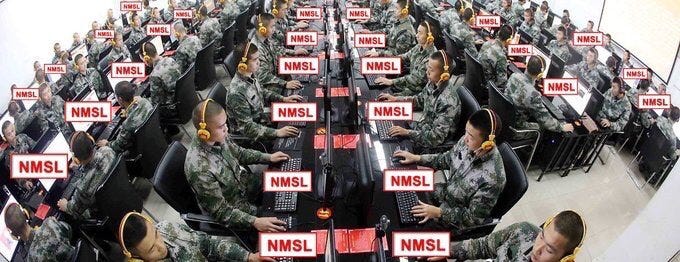Selling China's Story: How the Chinese Gov't Privatized Facebook Propaganda
Government agencies at all levels are hiring professional companies to take over their online discourse work – paying them to post positive stories in the west
The following article by Maggie Baughman won first place in the recent Rhodium ChinaTalk Student Essay Contest. She also appears in the most recent edition of the ChinaTalk podcast discussing her work. Editing by Callan Quinn.
Almost two decades after China began marshaling its “fifty-cent army” to manipulate public conversation on the internet, the players involved in China’s online “opinion guidance” have changed, heralding a new era of Chinese influence operations on social media.
It is time to look beyond the “fifty-cent army” model of paid-per-post propaganda (which has not been seriously re-examined in the last five years).
As China’s internet environment has rapidly evolved, so has its ability to influence opinion online, leading to the inevitable questions: who is running China’s online influence campaigns, and how do they work?
To build a new model of Chinese “opinion guidance,” we can look to some of the same sources that scholars used to support the existence of the “50-cent army” in 2015 – government procurement and employment websites.
Here, we see a change in the ways that local and central government organs are contracting out social media work: rather than paying individuals to post and promote content along with other government duties, local governments are contracting out social media influence work to private internet companies, who take over all of the agency’s social media operations for a set period of time.
To flesh out a picture of how the government pays private companies to handle its propaganda work on Western social media, I dug into Chinese government public procurement databases.
I collected hundreds of procurement announcements related to overseas social media (or “海外社交媒体,” haiwai shejiao meiti) projects posted to local and central government procurement network between 2013 and 2020.
These contracts – which have increased dramatically over the studied period, and span every province and government level in the country – reflect a growing marketplace in China’s internet industry: the privatized propaganda sector.
An in-depth analysis of hundreds of Chinese public procurement documents shows that government agencies at all levels are increasingly hiring professional companies to take over their social media management and online discourse work – paying them to post positive stories about the government, local culture, economic growth, or other quasi-political aspects of life in China.
The companies that the government hires to carry out its propaganda work are a diverse combination of state-owned media giants, technology companies, publishers, videographers, and marketing firms.
As demand has grown, so has the marketplace, with an increasing number of private firms pivoting their business scopes to win government social media contracts.
This big-picture look conveys the scope of this new marketplace, but fails to answer one of the most crucial questions: who are the firms behind the Chinese government’s new propaganda push?
I focus here on two case studies — two firms that have shifted their business models to address this growing demand in the Chinese market.
These companies, which work for both private and government clients, have developed unique methods of “marketing” on Western social media. They then sell this marketing expertise to Chinese government agencies, giving the government novel ways to access a Western audience – through the influencer economy and Facebook advertising.
Through studying the business models employed in these two case studies, we can see the market-driven evolution of the methods that Chinese government contractors use to promote state propaganda on Western social media, giving unique insight into the ways that China’s methods of influencing overseas discourse have become increasingly tied to private sector innovation.
I enjoy putting ChinaTalk together. I hope you find it interesting and am delighted that it goes out free to eight thousand readers.
But, assembling all this material takes a lot of work, and I pay my contributors and editor. Right now, less than 1% of its readers support ChinaTalk financially.
If you appreciate the content, please consider signing up for a paying subscription. You will be supporting the mission of bringing forward analysis driven by Chinese-language sources and elevating the next generation of analysts, all the while earning some priceless karma.
I. Shenzhen Yishan Media Company: How the CCP Can Purchase Western Influencers
In 2019, a company with essentially no online footprint was chosen to manage the Guizhou tourism bureau’s social media accounts and publicity campaigns – a surprising choice for a job dependent on proven social media expertise.
However, a deep-dive investigation reveals that the under-the-radar Chinese company is linked to an American-based branch with substantial funds and influence.
This company’s segregation of subsidiaries – distancing its American and Chinese branches – allowed it to recruit American talent through its US office without revealing its relationship with the Chinese government.
While the company’s resources appear concentrated in its US office, as a registered Chinese company, it can serve as a government supplier – granting the government access to its client list of foreign “Key Opinion Leaders” (KOLs).
I began by looking at two social media influence contracts awarded to the Shenzhen Yishan Media Company by the Guizhou City Tourism and Culture Bureau.
Shenzhen Yishan was registered in 2016, and continues to meet the basic requirements of an active company in China: submitting annual reports, tracking new locations, and keeping its legally liable personnel up to date.
But this company, despite its purported expertise in overseas social media work, is invisible on the Chinese-language internet: it has no online presence under its registered name – no social media accounts, no website, no regular job postings.
However, while Shenzhen Yishan did not have its own presence, an American company, EI Studio, claimed Shenzhen Yishan as its “China headquarters.”
EI Studio linked to Shenzhen Yishan Media Company on its contact page, citing the exact same address that Shenzhen Yishan used on its business registration.
EI Studio, like Shenzhen Yishan, never had a large online presence – either in China or in the US – but maintained social media accounts on Vimeo, Facebook, Instagram, and LinkedIn as “@eistudionyc” from 2016 through 2019.
During this period, EI Studio employed Chinese videographers and directors working in the NYC area, and more than half of its clients were Chinese companies, but it operated its website and social media solely in English.
Then, in 2019, EI Studio went dark. It disappeared from Western social media, simultaneously jettisoning the old website and its name – and removing its public connection with the Shenzhen office.
In the middle of that year, a previous member of EI Studio, Yue Zhao, registered a new U.S.-based company, this time using the name EI Commerce. EI Commerce quietly subsumed the now-defunct EI Studio.
What was behind EI’s sudden transition from a boutique videography and photography shop to a marketing and PR company? The company was negotiating a massive partnership with Sina Weibo.
Right as EI Studio dropped off the map, the Chinese tech giant announced a massive expansion into Western countries on multiple social media platforms.
EI Commerce was set to be a crucial advertising partner.
But the company did not undertake this partnership under any of the aliases it had previously used – EI Commerce, EI Studio, or Shenzhen Yishan.
Instead, it created a new unofficial DBA (“doing business as”), according to company LinkedIn profiles: the March Lion Agency. The March Lion Agency boasted a new specialty: influencer marketing.
Unlike EI Studio’s focus on photography and videography, the March Lion Agency specialized in recruiting and managing Western social media influencers. This project kicked off in late 2019, with a NYC branding event called “Influencers Night” attended by invited well-known Western social media figures.
During this period, March Lion started executing its project to bring Weibo into the Western social media sphere. They recruited Western influencers who had platforms on other social media accounts – Instagram, primarily – and brought them onto Sina Weibo.
These influencers made up a small and easily identifiable network. These influencers included Mishti Rahman, a Muslim Instagram influencer who has been profiled by Harper’s Bazaar, Clayclaim, a famous Youtuber who makes polymer clay figures, and Foxfell, a grunge make-up influencer.
Within a year of establishing their online presences, these influencers each had more than a 100k fans
This overnight fame in China, on platforms like Weibo, is particularly significant given how few Western influencers have been able to “crack” the Weibo market.
The March Lion Agency website (now bereft of any mentions of its predecessors) frames itself as a tool for “global brand and talent growth,” aimed at aiding non-Chinese customers at breaking into the Chinese media market. They tout their “influencer marketing network” with more than 10,000 influencers, and their services include posting on Weibo, Bilibili, Douyin, Little Red Book, and Wechat.
March Lion’s strategy seems to be to perform one service on behalf of two interested parties: for Western brands and influencers, they introduce them to the Chinese market, expanding their presence in China.
But they are simultaneously paid for this project by Sina Weibo, who has contracted March Lion to expand its Western footprint – by bringing on Western influencers (with the intention of luring their followers as well).
The contracts awarded to Shenzhen Yishan use vague language to convey a relatively mundane task – they were hired by the Guangzhou government to manage their social media profiles and websites.
However, through my investigation, I reveal that the company’s skillset stretches far beyond the scope of social media account operation: Shenzhen Yishan, through its March Lion Agency spinoff, has access to tens of thousands of influencers, Western KOLs, and a special relationship with Sina Weibo.
Shenzhen Yishan represents the government’s link to a vast influencer network independent of its state-owned social media giants.
II. Yiqilian: How Facebook is Set Up to Aid the Chinese Government
Chinese marketing firm Yiqilian, an official Facebook Marketing Partner, uses Facebook’s training and advertising resources to run government propaganda campaigns.
Yiqilian is a founding member of Facebook’s “ad-reseller” program, its way of accessing the Chinese advertiser market. Yiqilian’s partnership with governmental clients is not only not discouraged, but is actively touted by Facebook, which relies on direct and indirect Chinese government funds for a significant portion of its advertising revenue.
Social media marketing firm Yiqilian (北京亿起联科技有限公司, Beijing yiqilian keji youxiangongsi) won the highest number of contracts of any private (not state-owned) firm over the past seven years, undertaking seven unique projects for three main government clients: the Tianjin government’s tourism department, the Xiamen government’s tourism department, and China Southern Airlines.
Yiqilian is one of technology firm Join-Cheer’s (Beijing jiuqi ruanjian gufen youxian gongsi, 北京久其软件股份有限公司) 28 subsidiaries.
Yiqilian owns an integrated “Internet+” marketing platform called “PandaMobo,” which is its most popular product and the center of its marketing platform.
Notably, PandaMobo is one of only ten Chinese companies who can legally and directly advertise on Facebook, acting as an ad agent without registering a Facebook account through a VPN.
PandaMobo is an “Officially Recognized Agent” (renke daily shang, 认可代理商) for Facebook through a special “Facebook for Business” program that allows Chinese marketing firms a pathway to advertise on Facebook, despite the platform being banned within China.
Facebook maintains a website that gets past China’s Great Firewall (which blocks anything hosted on the facebook.com domain) to recruit potential Facebook advertisers, and to connect them with “marketing agents” to manage publicity campaigns.
Marketing agents act as “resellers” or intermediaries who run ad campaigns on behalf of Chinese companies.
This program on its own now accounts for an estimated 10% of Facebook’s topline profits, netting more than $5 billion, and representing the second-largest ad market for the company after the U.S.
Facebook provides a clear step-by-step guide for Chinese companies to reach, influence, and measure their engagement with targeted subsets of foreign users, and makes these tools readily available to the government.
Facebook Connect clients, including government clients, to its API and advertiser toolkits, which they can use to directly target specific audiences abroad.
Facebook released a “white paper” written only in simplified Chinese specifically for a PRC audience that includes tips, statistics, and case studies for advertising to Western audiences on its platform. The tools available to Chinese companies are technologically sophisticated and allow the clients (including government clients) to identify specific target populations for ads and measure their engagement.
Facebook’s marketing statistics show that Chinese government clients effectively used the tools provided to them by the company to reach and influence foreign consumers – with numbers reflecting that Facebook not only provided access to foreign audiences, but facilitated shifting sentiments in line with a Chinese government project.
One key example is the Friendly Shandong partnership (run by one of the “Official Partners”). Shandong’s official tourism campaign, “Friendly Shandong,” aimed to increase Australian tourism through promotion of a Shandong Beer Festival.
The statistics from Facebook indicate that 2.5 million users viewed Friendly Shandong ads within a single month, with 1.6 million views for the videos (a tripling of previous total viewership), and a 13-point increase in brand reputation.
Yiqilian, through PandaMobo, has been using Facebook’s tools to run campaigns similar to the Shandong case study for governmental tourism bureaus. Their contracts with government clients have been repeatedly renewed over a number of years.
For example, PandaMobo has been running Xiamen’s tourism campaigns since at least 2017, controlling the “Visit Xiamen” official Facebook page, Instagram, YouTube, and Twitter.
The “Visit Xiamen” campaign, like others run by Yiqilian, is thinly veiled propaganda disguised as a tourism campaign. One topic of particular focus is the Belt and Road Initiative.
The “Visit Xiamen” channel has video playlists called “international BRICS” and “government works,” while the Facebook page includes a now-defunct “#BRICSFootPrint2018” event.
In the past two years, the Facebook page ran at least one advertisement flagged and removed by Facebook for sharing political material without a disclaimer. While PandaMobo has not released public engagement statistics in the last few years, it boasts that these campaigns have increased engagement by almost 20%.
Yiqilian’s skillsets go far beyond managing a government agency’s regular social media posts. Through their special relationship with Facebook, they connect Chinese government end-users to Facebook’s marketing and targeting tools, which have been specifically presented to maximize influence, particularly for tourism campaigns.
Yiqilian resells Facebook tools to government clients, with Facebook’s express knowledge and encouragement, signaling that the Chinese government can access precise population targeting tools and extensive engagement statistics.
Yiqilian, like other “official Facebook partners,” could provide Chinese government units with the types of targeting and messaging tools that Cambridge Analytica and the Russian government used to fuel misinformation on the very same platform.
III. Conclusions
Investigating two firms that the Chinese government has hired to undertake its social media work shows how China’s developing private sector internet firms have evolved in tandem with the government’s approach to online propaganda.
As the government increasingly depends on the private sector to access Western social media, more internet enterprises have consciously shifted their business scopes to meet that demand.
These case studies also reflect how Chinese internet companies co-opt Western actors – influencers or companies – to access an overseas audience.
As private internet firms in China continue to innovate in the social media sphere, building their toolkits in line with a changing online environment, the government will continue to access these new methods of influence.
In a true paradigm shift from the “fifty-cent army” paid-per-post propaganda model, the adoption of “privatized propaganda” will allow for consistent, market-driven innovation – and a constantly shifting toolkit for online influence.
Want more analysis on the topic? Maggie was the guest in the most recent edition of the ChinaTalk Podcast.




